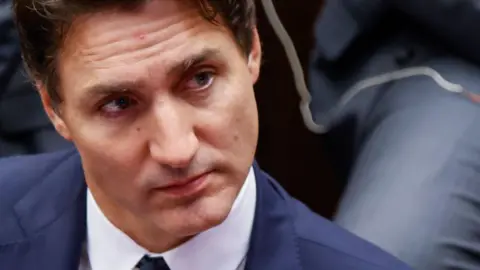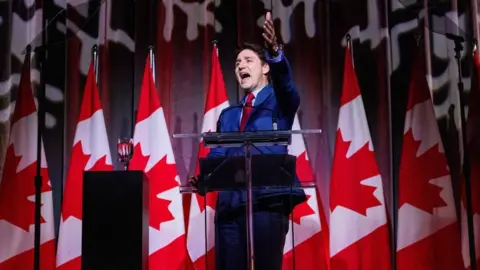Faced with chaos, a defiant Trudeau is waiting for now

 Getty Images
Getty ImagesIt was one of the worst weeks of his political career, and Canadian Prime Minister Justin Trudeau was mourning the season.
At the Liberal Party’s annual holiday gathering, Trudeau put on the face of his party, despite having been in the spotlight the day before for the sudden resignation of one of his most trusted allies, Finance Minister Chrystia Freeland, just hours before she was due to deliver an economic statement on the United States. Parliament.
But as other members of his party told him to leave, the prime minister spoke in a stern, defiant voice as he addressed the loyal crowd in his blue suit and tie.
He spoke of his “difficult” week, comparing it to a family battle.
He discussed being “dauntless” and “ambitious” in the face of adversity, and he criticized his political rival, Pierre Poilievre, leader of the opposition Conservative Party of Canada.
Pundits commented afterward that it sounded like a campaign speech, and that despite the recent political turmoil, Trudeau seemed to be digging in.
The situation did not change on Friday, even after the leader of the progressive New Democrat Party (NDP) Jagmeet Singh said he would present a proposal to topple Trudeau’s government in the new year. It was the support of the NDP that kept the Liberals in power. Elections now seem imminent.
However, Trudeau has so far not indicated that he will resign soon, although he is said to have told members of the party that he will take time during the winter break to think about what to do.
Political observers say Trudeau has always shown irreverence when under pressure, which has helped him overcome many controversies during his nine years in office.
And he is often underestimated, as when he won a majority government in 2015 at the age of 44, despite being portrayed by his political opponents as mysterious.
But as pressure mounts for him to resign, some of those experts say he may need a new strategy.
 Reuters
ReutersProving his doubters wrong
When Trudeau first ran for prime minister, three words followed him around: You’re just not ready.
That phrase was the tagline of an attack ad that has been played repeatedly across the country as he tries to unseat incumbent Prime Minister Stephen Harper, a Conservative who has been in power since 2004.
It conveyed the common criticisms he faced at the time about his age, his lack of experience related to his approach to politics.
Trudeau “kind of wandered” as a child before becoming a drama teacher in Vancouver, said Canadian historian Raymond Blake, who appears to have been the famous and wealthy son of former Prime Minister Pierre Elliott Trudeau.
But not long after entering politics, Trudeau took a combative stance.
It is a characteristic that some say he learned from his father, who was known for his interesting but oppositional leadership, and famous for the phrase “just watch me,” which he told a journalist frankly during the political process. disaster.
“His father had the image of being a tough, tough politician,” said Lawrence Martin, a longtime Canadian political columnist based in Washington DC.
The younger Trudeau continued to defy the odds by reversing a historic victory for his Liberal party, moving them from third place in parliament to a majority in his first federal election.
“This kind of makes him feel like he can overcome big obstacles,” Mr Martin said, adding that, politically, Trudeau is operating with “a lot of confidence”.
Trudeau’s path to power took a turn for the worse when he took office, after being involved in several political scandals.
In her first session, Justice Minister Jody Wilson-Raybould – the first indigenous woman to hold the job – resigned due to what she described as attempts to interfere and “veiled threats” by senior government officials seeking legal recognition of a company accused of corruption. .
As he runs for a second term in 2019, Trudeau’s re-election campaign has been rocked by photos released showing him in blackface at least three times.
And a year later, in 2020, Trudeau faced yet another ethics scandal involving a potentially huge government contract for a youth charity that had worked with members of the Trudeau family.
But despite all the setbacks, Trudeau clung to power. He also won two elections, making him the longest-serving leader of his G7 peers.
“Trudeau is very much a survivor,” said Prof Blake, noting that his political and leadership achievements have earned him the loyalty of many in his party despite the scandals.
Is Freeland’s exit a turning point?
While Trudeau has weathered many storms, there are signs that his time may be up.
For one thing, history is not on his side. Only one Canadian prime minister, Sir John A MacDonald – the first in the country – has served four consecutive terms.
Trudeau is also running against declining popularity. A September survey from Ipsos suggested that nearly two-thirds of Canadians did not wake him. Only 26% of respondents said Trudeau was the prime minister’s choice, putting him 19 points behind Conservative leader Poilievre.
Then there’s the slowly waning support from Trudeau’s own party. So far, at least 18 Liberal MPs have called on their leader to step down.
“He’s delusional if he thinks we can go on like this,” New Brunswick MP Wayne Long told reporters this week.
“It is not fair to us MPs, it is not fair to the ministers and most importantly it is not happening to the country. We must continue on a new path and we must start from scratch.”
According to Long, who pushed for Trudeau’s removal, 50 out of 153 Liberal MPs want him to step down immediately. About the same number are Trudeau supporters, he said, and others are on the phone.
“There are still supporters of the club who love him and, you know, want to support him,” said Mr Martin. a writer based in DC. “But if you had a secret Liberal caucus vote on whether he should continue or not, he would have been easily defeated.”
The prime minister appears to be motivated to continue to defy his political adversary Poilievre, said Mr Martin.
“He doesn’t want to back down, and he wants to face Pierre Poilievre, whom he hates,” he said.
Trudeau’s dogged persistence in the face of an adverse political climate has been compared to outgoing US President Joe Biden, who left office a few months before the November election after mounting domestic pressure.
Professor Blake said Trudeau’s legacy, like Biden’s, will depend on how he comes out. Fighting a losing battle, he said, would give Trudeau a “permanent scar”. But the prime minister has an amazing ability to survive, he noted.
“He’s been a survivor, and he hasn’t done what’s normal. Is normal – whatever that is – going to come into play at this point? Maybe, but I’m not sure.”
Trudeau’s problem is similar to that faced by his father, who won the election three times in a row, and won the fourth time after leaving office for less than a year.
But in 1984, more than 15 years after he became prime minister, the elder Trudeau – like his son now – faced tough votes. It seemed clear that he would not win the next election if he continued. He decided to step down, telling the public that he made the decision after walking through a snowstorm in Ottawa.
Since then, the term “go on the ice” has become synonymous with political resignation in Canada. This Christmas, it remains to be seen whether Trudeau will make his trip.
Source link




